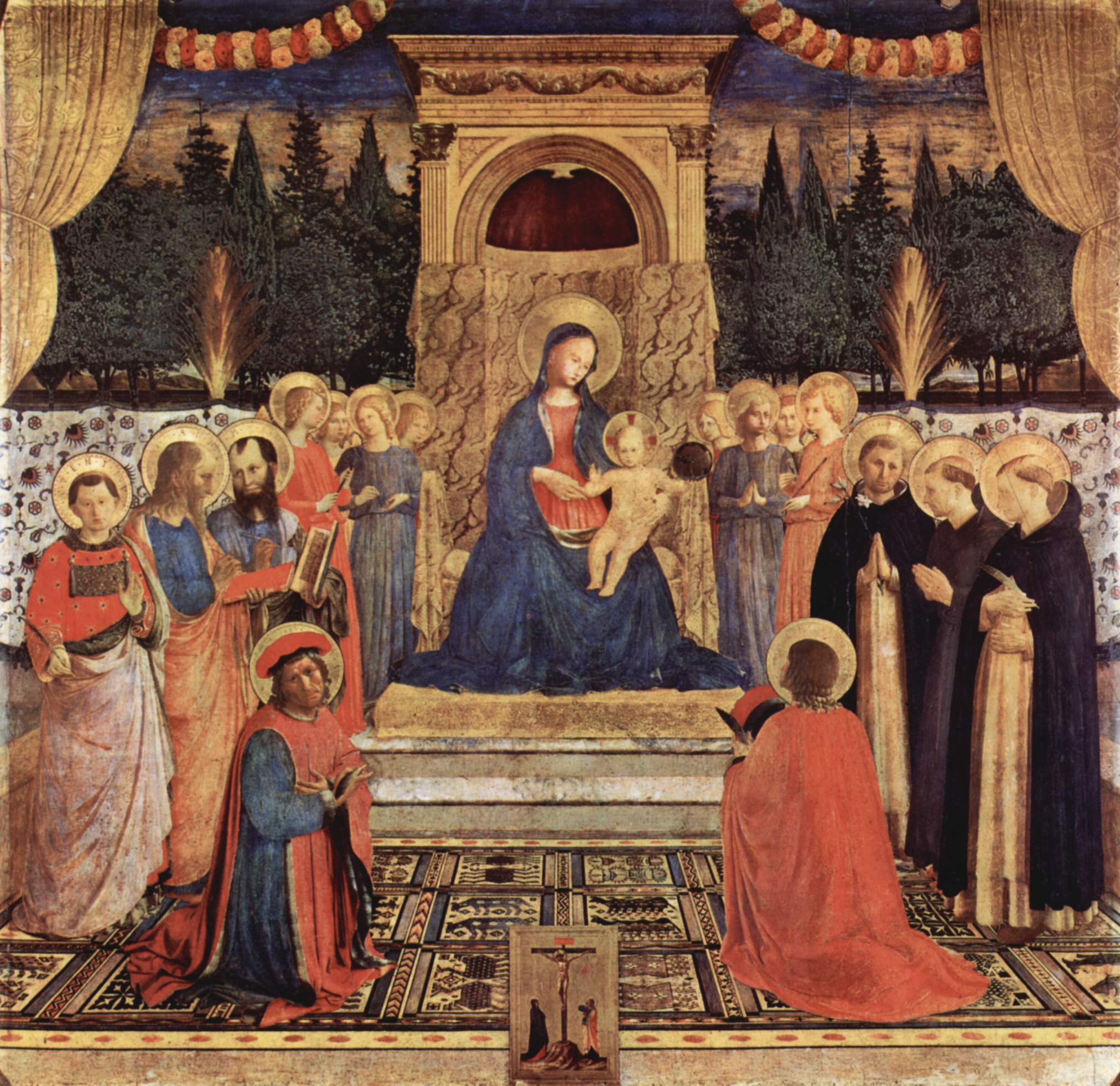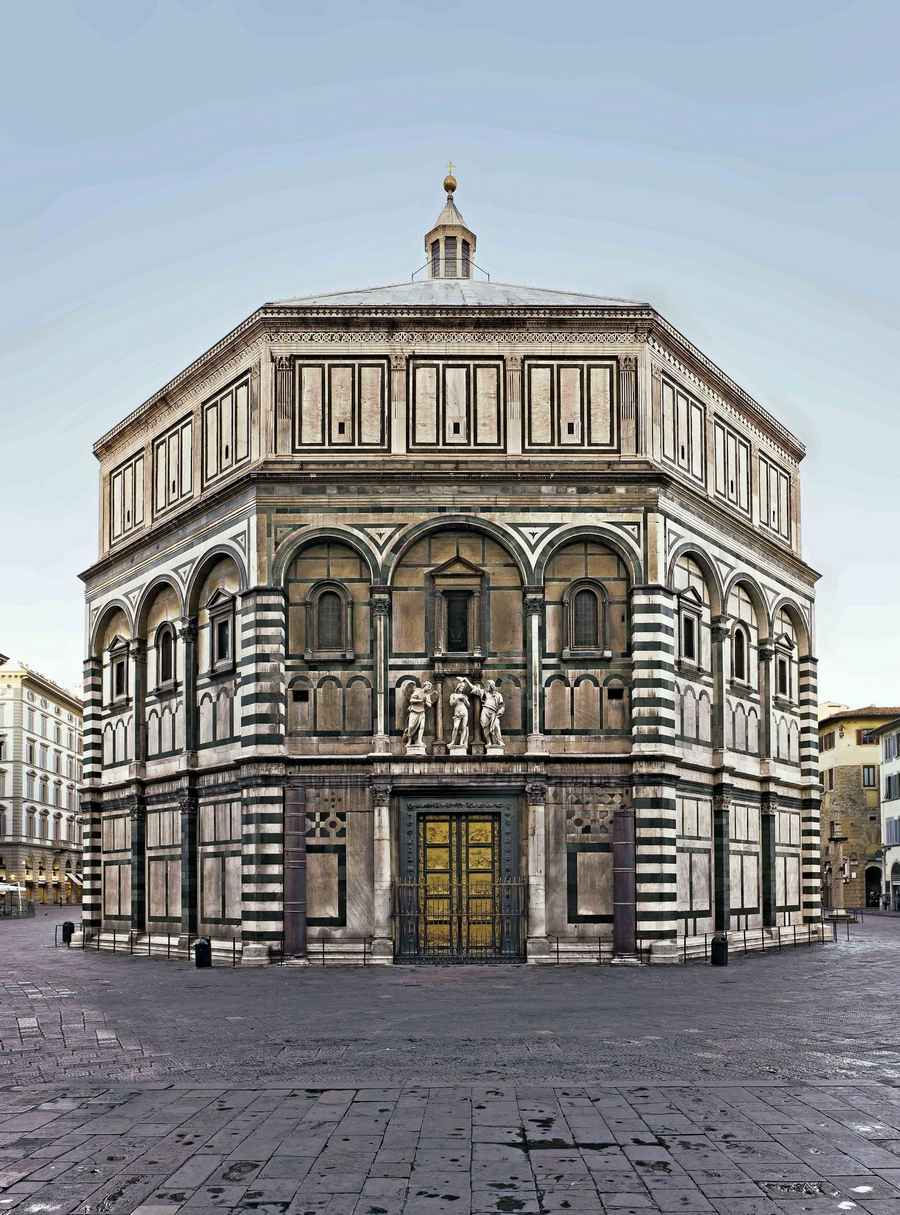Still discussing St Mark's Basilica: "From the vine-leaves of that archivolt, though there is no direct imitation of nature in them, but, on the contrary, a studious subjection to architectural purpose more particularly to be noticed hereafter, we may yet receive the same kind of pleasure which we have in seeing true vine-leaves and wreathed branches traced upon golden light; its stars upon their azure ground ought to make us remember, as its builder remembered, the stars that ascend and fall in the great arch of the sky; and I believe that stars, and boughs, and leaves, and bright colours are everlastingly lovely, and to be by all men beloved...I believe the man who designed and the man who delighted in that archivolt to have been wise, happy, and holy."
Whether this last is literally true as a general circumstance is not important. To see or to conceive of any aspect of human experience of life as possessing beauty, and by extension meaning, and to convey that conception to others through the peculiarly human arts--language, symbols, architecture, music, illustration, etc--is to have fulfilled the function of being human to the highest degree--and it is only in this that true wisdom, happiness and holiness lies, even if the wise man considers himself to be extremely wretched and stupid on account of more trivial matters.
Another central and intriguing idea of the book, which I have never seen dwelt on much elsewhere: "We attach, in modern days, a kind of sacredness to the pointed arch and the groined roof, because, while we look habitually out of square windows and live under flat ceilings, we meet with the more beautiful forms in the ruins of our abbeys. But when those abbeys were built, the pointed arch was used for every shop door, as well as for that of the cloister, and the feudal baron and freebooter feasted, as the monk sang, under vaulted roofs; not because the vaulting was thought especially appropriate to either the revel or psalm, but because it was then the form in which a strong roof was easiest built." Assuming this is true, and it does smack heavily of conjecture, it suggests many other questions, the most obvious of course being the eternal question of whether technology as we understand it, and certainly as we apply it, is crippling our ability to develop our humanity to this degree to which Ruskin refers. This question is almost always dealt with with us from the general material point of view, which no one in modern Western Civilization can really see around enough to divorce from anything else. Namely, we don't want to give up our comforts, our health system (which occupies the energies of what, 20% of the population now, and growing?) our ease, and even if we sense something of the sort to be the case in a vague way it is difficult to advance the argument publicly that these might be in any general way antithetic to realizing a more exalted state of humanity. That sort of intimacy with the sense of man's proper place in the universe (probably rather grim materially) and leading one's life somewhat in harmony with that which Ruskin appears to be championing, if it ever existed was based, I would imagine, on a fairly compact and readily interconnected unity of knowledge within both individuals and communities--the better one's mind, the further one could range, but he could not become untethered from the core unity from which all his understanding, and that of his fellows, emanated. This is something of the liberal arts ideal of course; it is not against the expansion of knowledge, but it emphasizes the importance of the unities being in place on which to graft that knowledge.
Fig 1: Fra Angelico--Adoration of St Dominic I guess we lost the picture.
"...because the Gothic and Byzantine styles are fit for churches, they are not therefore less fit for dwellings. They are in the highest sense fit and good for both, nor were they ever brought to perfection except where they were used for both."
"I cannot answer for the experience of others, but I never yet met with a Christian whose heart was thoroughly set upon the world to come, and, so far as human judgement could pronounce, perfect and right before God, who cared about art at all." This is an almost intuitive idea once you have some basic grasp of Christian theology, but the reality of maintaining such an attitude appears to be terrifying to more sophisticated people even if they are sympathetic to or even enthralled by some aspects of its possibilities (in Catholicism this terror apparently emanates from the very top). On a side note I have been finding many of the beautiful pictures for this series on websites and blogs dedicated pretty much exclusively to Catholic news and discussions of the myriad doctrines and services and robes and so forth of the Faith. I don't know who these people are, or where they get the time for their discourses, but they are certainly hardcore. I, by comparison, am not hardcore. I am self-indulgent. Which brings us nicely to...
Figure 2--The Baptistery, Parma I was never in Parma. It's looking pretty nice to me right now. A place like that, which is a city of considerable historical significance, but not particularly over-visited, I would not feel I was overstepping decency by poking around in a bit.
"Thus most Protestants, entering for the first time a Paradise of Angelico, would be irrevocably offended by finding that the first person the painter wished them to speak to was St. Dominic; and would retire from such a heaven as speedily as possible..." I evidently thought this was hilarious at the time.
Fig 3. The Dome of the Cathedral at Pisa I was never at Pisa either. It sounds like the sort of place I would have enjoyed; old, cheap, and home to a university (hence lots of bourgeois-intelligent people idling around in taverns and cinemas and that sort of thing). Obviously it is a mecca for kitsch tourism, but I really only mind that because I usually feel like I am near the top of everybody's list of candidates for who should be persuaded to stay home in the future travel utopia. I understand also that most visitors only stay in town for four hours or so and move on.
Fig. 4--This was supposed to be the Baptistery in Florence. I am sure most people know what this looks like already though.
Another long note, but I found it to be interesting: "All the efforts of Byzantine art to represent violent action are inadequate, most of them ludicrously so, even when the sculptural art is in other respects far advanced. The early Gothic sculptors, on the other hand, fail in all points of refinement, but hardly ever in expression of action. This distinction is of course one of the necessary consequences of the difference in all respects between the repose of the Eastern, and activity of the Western, mind..."
I know nobody reads these 12-part reviews of books. I need the practice of trying to decipher ideas and also to state my own as closely as possible. Also I like looking for and putting up the pretty pictures.
"...the man must be little capable of receiving a religious impression of any kind, who, to this day, does not acknowledge some feeling of awe, as he looks up to the pale countenances and ghastly forms which haunt the dark roofs of the Baptisteries of Parma and Florence..."
Fig 5. The Main Entrance of St Mark's Basilica I am pretty sure this entrance is referenced in one of the last 2 quotes.
There is some writing embedded in the mosaic over the main entrance (according to Ruskin): "I AM THE DOOR: BY ME IF ANY MAN ENTER IN, HE SHALL BE SAVED."; "I AM THE GATE OF LIFE; LET THOSE WHO ARE MINE ENTER BY ME."; and "WHO HE WAS, AND FROM WHOM HE CAME, AND AT WHAT PRICE HE REDEEMED THEE, AND WHY HE MADE THEE, AND GAVE THEE ALL THINGS, DO THOU CONSIDER." Of the symbolism of this, he says: "...every one who at any time entered was supposed to look back and to read this writing; their daily entrance into the church was thus made a daily memorial of their first entrance into the spiritual Church..." This sounds like the sort of basic thing that everybody knows already, and is conscious that they are supposed to be thinking of when they enter a church with writing over the door. You will have to excuse my foolishness in copying this. I am an eternal novitiate in all matters corresponding to symbolism and the Spirit.



No comments:
Post a Comment